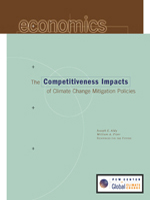The Competitiveness Impacts of Climate Change Mitigation Policies

In the debate over mandatory policy to reduce the United States’ greenhouse gas emissions, a major issue has been the potential impact on the competitiveness of American industry. Many are concerned that if the United States moves forward with mandatory climate policy while other countries do not, U.S. jobs and production will move to emerging economic powers like China and India. This economic relocation would be accompanied by emissions “leakage,” with greenhouse gas reductions in the United States offset by increases elsewhere.
For the most part, the climate competitiveness debate has proceeded in the absence of hard data. With this report, the Pew Center on Global Climate Change hopes to contribute to a firmer analytical understanding of the potential for competitiveness impacts and of policies to address them. Through a detailed econometric analysis, authors Joseph E. Aldy and William A. Pizer provide a unique and robust quantitative assessment of the potential competitiveness impacts of mandatory climate policy on U.S. industry. Their findings strongly suggest that such impacts would be both modest and manageable.
First, the analysis indicates that, at a carbon dioxide price of $15 per ton, the competitiveness concern does not extend to the economy as a whole, but rather centers on a fairly narrow segment of U.S. industry — energy-intensive industries whose goods are traded internationally. Second, it projects that at that price, energy-intensive sectors will experience only modest declines in production. Third, most of the projected economic impact on energy-intensive industries reflects a move toward less emissions-intensive products—as would be expected from an effective climate change policy—not an increase in imports or a movement of jobs or production overseas. While the analysis does not rule out larger effects on a narrower set of industries or firms, it weighs against any notion of broad impacts even for typical energy-intensive firms.
It is clear from this analysis that fear of competitive harm should not stand as an obstacle to strong climate change policy. Further, policymakers have available to them a range of policy tools to mitigate the modest economic impacts that may be foreseen. Under a cap-and-trade system, for instance, emission allocations can be used to cushion the impact on energy-intensive sectors. As the authors argue, any policy response should be narrowly targeted to vulnerable sectors. In the long run, the best safeguard against competitiveness impacts is a comprehensive and effective international climate framework. In the meantime, smart policy can mitigate the potential economic risks.









